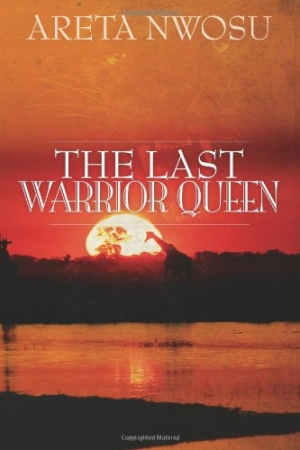The Last Warrior Queen
Imagine a powerful realm ruled by queens, where an elite defensive force of women protects the country with its magical powers. Critically acclaimed writer Areta Nwosu, whose first novel was one of six finalists nominated for the Pat Utomi Book Prize, creates such a place in The Last Warrior Queen.
Meramara is an African country protected by women known as the Jemaya. Discontent lurks below the surface of this seemingly peaceful nation. Jealousy, murder, and betrayal lead to adultery, invasion by countries seeking to sell slaves to Europeans, and loss of the Jemaya’s powers. The men of Meramara revolt, topple the matriarchy, crown a cruel king, and strip women of all their rights. Meanwhile, Lord Badri, commander of the armies, purchases a feral slave named Zaare, who, according to some, is destined to restore the matriarchy.
Nwosu spins a lush, fantastical epic that combines magic, mythical creatures, and problematic romance with commentary on contemporary issues of slavery and plural marriage. Although the bulk of the story centers around Zaare and Badri, the novel begins years before Zaare’s birth, and readers are treated to a stunning scene of the gallant Jemaya in action. Indeed, it takes a long time before Zaare herself appears, while the author introduces and establishes those who will later become the betrayers and the betrayed. As readers get to know these individuals and see their personalities develop over time, the villains become more dynamic characters. The slow buildup of the narrative also helps ground the story of Zaare and Badri in necessary context.
Romance lovers will appreciate Badri as the tempestuous yet tender alpha male, and will find Zaare’s response to him pleasantly surprising when another man bids for her affections. Possessed of an inner fortitude, Zaare never loses her strength, even during the most dire of situations. Her grit makes her someone female readers will want to emulate. The country Meramara, too, comes alive, with its gods, governmental practices, and laws well integrated into the tale. Readers will enjoy visiting the matriarchal country.
The story goes a bit astray at the end when the author adds a confusing coda set in the present, but this does not affect the overall majesty of The Last Warrior Queen.
Reviewed by
Jill Allen
Disclosure: This article is not an endorsement, but a review. The publisher of this book provided free copies of the book and paid a small fee to have their book reviewed by a professional reviewer. Foreword Reviews and Clarion Reviews make no guarantee that the publisher will receive a positive review. Foreword Magazine, Inc. is disclosing this in accordance with the Federal Trade Commission’s 16 CFR, Part 255.

